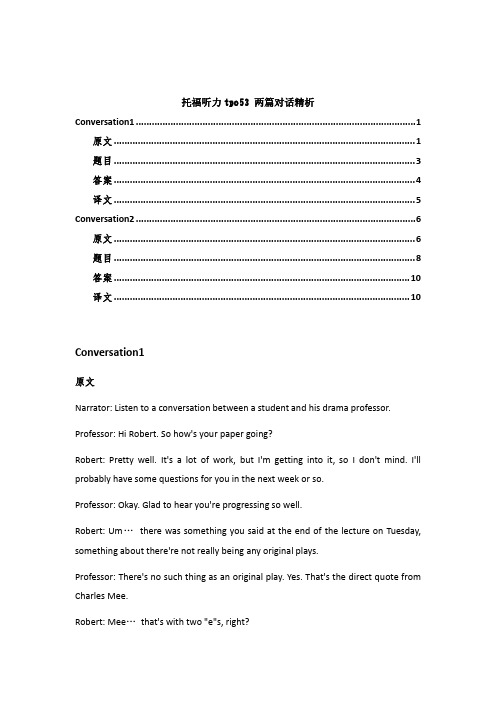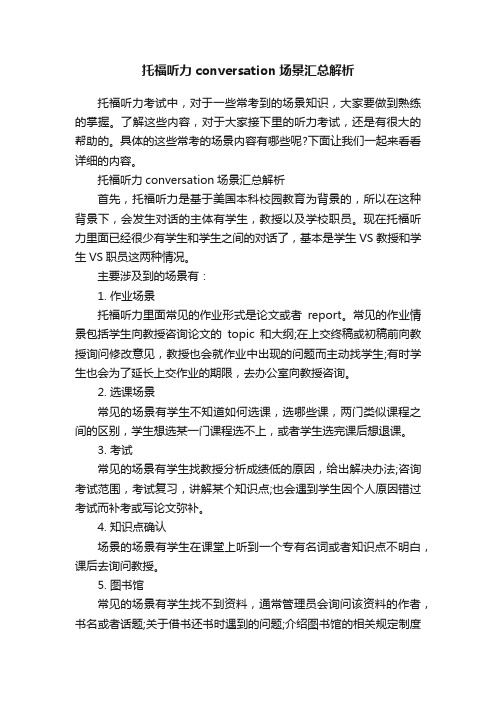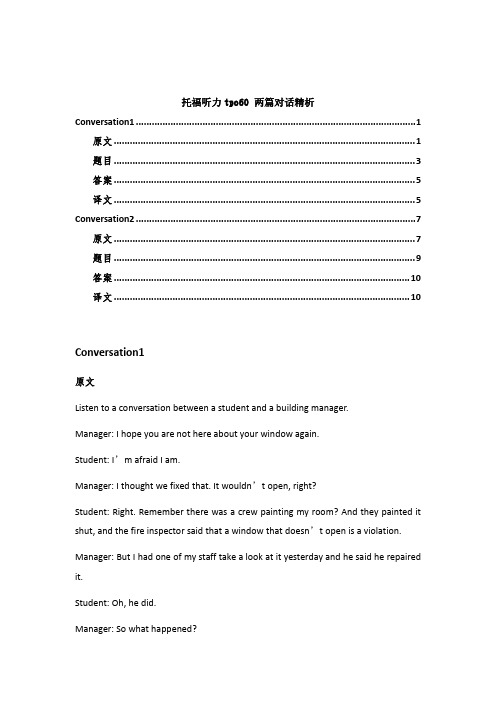托福听力对话conversation常考场景罗列介绍
托福听力强化 conversation篇

Speaker’s attitude and purpose
Conprehend the implication of the conversation
Conversation 文章套路
寒暄
问题
解答
1. Concern 2. 另一个问 题
Help(最终 解决)
托福听力场景汇总之CONVERSATION 篇
Conversation 篇 谢晓菁
Content
Conversation 六大出题点
Conversation 文章套路
Conversation 场景汇总
Conversation 六大出题点
Grasp the main ideas and supporting details Understand the relationship between ideas
(2) 老师对学生的疑问:What does the professor concern about?
课程太难听不懂
学生选课太多跟不上 学生基础太差 (3) 学生对自己情况的分析 (4) 关于退课和放弃课程 (5) 文章结尾的延伸:What is the teacher going to do next? What is the student going to do next? What does the student feel atthe end of the conversation?
课堂学习相关 课外学习相关 课余生活相关
日常起居相关
课堂学习相关
课程相关事务场景 选课场景 迟到旷课场景 转学场景 实验室场景场景特点:主要涉及到一些和课程相关事项的 解决方法。一定以conversation出现,常见话题 有:安排考试,调课事宜,课程辅助材料等。、
托福听力对话类各大类出题点汇总介绍

托福听力对话类各大类出题点汇总介绍托福听力的对话conversation的难度相对较低,而且两人对谈的形式也让大家比较容易听懂对话的内容。
今天给大家带来了托福听力对话类各大类出题点汇总介绍,希望能够帮助到大家,下面就和大家分享,来欣赏一下吧。
托福听力对话类各大类出题点汇总介绍托福听力对话出题点介绍:开头结尾托福听力对话出题点中最为常见的是集中在对话开头结尾部分的各类信息,比如开头部分提到的原因,也就是学生去询问老师问题或是去咨询学校工作人员的起因,问题中十有89都会问这个对话发生的原因。
而既然有原因自然也会有结果,这个结果一般都是对话中被询问的人给出的,比如建议解决方案等等,也是非常高频的出题点。
所以考生在听一段对话时,对于开头原因和结尾结果都需要认真听懂,因为这些基本上都是非常高频的考点。
托福听力对话出题点介绍:语法现象除了开头结尾以外,对话的中间部分也包含了许多考点,这其中有些语法现象一旦出现大家也需要引起警惕,比如对话中出现两次以上重复的部分就比较容易成为考点,因为重复就代表着暗示和强调。
而说到强调,各种强调类的句式中包含的信息也一样要多加注意,如It is that...;This is the first time...; One thing important is that...等等。
而除了句式外,词汇方面也有不少细节会给出作为出题点的提示,比如形容词和副词,如果出现了最高级的表达,那么跟在这类表达之后的信息点是出题点的几率也会变得很高。
而一些针对上下文内容带有明显肯定或是否定的表述,特别是用到了极端化或是评价性副词的情况,后面紧跟的内容十有89都会是考点,这类副词有exactly;absolutely;definitely; It’s a good question等等。
托福听力对话出题点介绍:论点主题接下来要说的是围绕对话主题论点的常见出题点。
首先是对于和主题论点相对的其它观点的引用,这些引用的作用多半是为了突出和对话观点存在的对比,用不同观点对比来展开论述。
托福听力tpo53 两篇对话精析

托福听力tpo53两篇对话精析Conversation1 (1)原文 (1)题目 (3)答案 (4)译文 (5)Conversation2 (6)原文 (6)题目 (8)答案 (10)译文 (10)Conversation1原文Narrator:Listen to a conversation between a student and his drama professor.Professor:Hi Robert.So how's your paper going?Robert:Pretty well.It's a lot of work,but I'm getting into it,so I don't mind.I'll probably have some questions for you in the next week or so.Professor:Okay.Glad to hear you're progressing so well.Robert:Um…there was something you said at the end of the lecture on Tuesday, something about there're not really being any original plays.Professor:There's no such thing as an original play.Yes.That's the direct quote from Charles Mee.Robert:Mee…that's with two"e"s,right?Professor:Yep.M-E-E.You'll probably be hearing a lot about him.He's becoming a pretty famous playwright.Robert:Yeah,well,I've been thinking about his quote.I mean there must be some original plays out there.Professor:I’ll grant that he's overstating things somewhat.But the theater does have a long tradition of borrowing.Take Shakespeare,like most writers of his day,he borrowed plots from other sources unabashedly.And the ancient Greeks,all the plays they wrote were based on earlier plays,poems and myths.Robert:And borrowing applies to plays being written nowadays,too?Professor:To some extent,yes.Mee,for example,he's made a career out of remaking plays,one of which we"ll be studying soon.It's called Full Circle and Mee based it on an earlier play by a German playwright.Robert:Oh Full Circle…wasn't that based on the Caucasian Chalk Circle?Professor:That's right.Robert:I remember hearing about that play from my acting coach.Professor:Okay.Well,the Caucasian Chalk Circle was based on a play by yet another German playwright,someone who was fascinated by the ancient literatures of China, India and Persia and many of his works were adapted from those literatures, including his version of the Chalk Circle which was based on an early Chinese play.Robert:So this Full Circle play,by Charles Mee,the one we're going to study,it's like the third or fourth remake.Wow…And we complain that Hollywood keeps making the same movies over and over again.Professor:Well,part of what Mee's trying to do is drive home the point that:One, theater's always a collaborative effort.Robert:Well,yeah,the playwright,the director and the actors,people have to work together to produce a play.Professor:Yes,of course.But Mee means historically.The dramatic literature of early periods is hugely influential in shaping later dramatic works.Robert:So it's like when the playwright bases a play on a previous playwrights theme or message.It's like they're talking to each other,collaborating.Uh,just not at the same time right?Professor:Exactly.And the second point Mee's trying to make,I think,is that it's legitimate to retell an old story in a new way,in a way that's,uh…a more in line with contemporary concerns.So when playwrights reinvent or update an earlier play it shouldn't be construed as a lack of imagination or an artistic failure.题目1.Why does the man go to see the professor?A.To discuss a play he heard aboutB.To get feedback on a paper he is writingC.To ask about a point made in classD.To get information about an acting coach2.Why does the professor mention Shakespeare and the ancient Greek playwrights?A.To support her statement that some original plays do existB.To show that playwrights historically have used themes from earlier playsC.To point out that Shakespeare was greatly influenced by ancient Greek playsD.To give examples of playwrights whose plays have inspired later playwrights3.What does the professor imply about the play Full Circle by Charles Mee?A.It served as the basis for a Hollywood film.B.It is indirectly based on a Chinese play.C.It has influenced a more recent play.D.It uses themes from ancient Greek literature.4.What two points does Charles Mee make about playwriting?[Click on2answers.]A.Rewriting old plays to deal with modern issues is a respectable practice.B.Playwrights should preserve as much of the original as possible when updating an older play.C.Older plays tend to show more imagination than newer plays.D.In a way,modern playwrights work with playwrights of the past.5.What does the man imply when he says this:(MALE STUDENT):[doubtful]I mean, there must be some original plays out here.A.He thinks the professor misunderstood his point.B.He has written some original plays himself.C.He doubts that what Charles Mee said is true.D.He has read some original plays by Charles Mee.答案C B B AD C译文Narrator:请听一段学生和他的戏剧教授的对话。
托福必背 听力教程【Conversation+Lecture】

听力Listening 【考题】1、2段对话(不能失分)5 Questions X 2篇2、4段讲座(各错一题)6 Questions X 4篇3、题型主旨:main idea?Why?细节:Who,When,Where,Why,What,How关联:表格,对比,排序表意:复听,态度组织:主线+支线信息*考题跟着文章顺序来【Conversation】①校园生活:problem(提问,分析,解决)1、目的2、问题,起因,cause & effect3、建议,解决办法,Suggestions & Solutions(建议,办法不可行Difficulties)4、结果,Action, Requirement笔记:竖着记,记框架结构记动宾短语(以听为主,以记为辅)注意额外信息②课程相关:Academic1、目的,主题(目的≠主题)2、课业,project, paper, research3、要求,态度,评论4、研究结果,调查报告(额外信息)5、对话结果,Action(一个或多个)笔记:注意强调—语气,信号词,转折(But, However, Although)后接考点【Lecture】高频学科:艺术、地质、天文、动植物、环境科学1、分类classification2、对比contrast3、Problem, Solutions, Cause, Effect笔记:①主题(≠主旨)开头段:Today, Now OR 额外信息,So,捕捉强调语气定义:细节点②例子,额外信息,以及其作用,为前面内容服务For example③过程:必考,记关键词④强调:语音语调信号词(Remember, Don’t forget, I’m sure, interesting, interestingly )转折⑤列举:数字⑥研究结果,评价⑦问答,改变[Life science]1、特征,用途2、分类,主题3、习性4、生长环境5、过程6、繁殖7、与其他生物关系8、生存状况(过去—未来)9、研究成果,评价[地质]1、现象2、定义3、过程—顺序4、举例,列举5、原因(学说)。
托福听力conversation场景汇总解析

托福听力conversation场景汇总解析托福听力考试中,对于一些常考到的场景知识,大家要做到熟练的掌握。
了解这些内容,对于大家接下里的听力考试,还是有很大的帮助的。
具体的这些常考的场景内容有哪些呢?下面让我们一起来看看详细的内容。
托福听力conversation场景汇总解析首先,托福听力是基于美国本科校园教育为背景的,所以在这种背景下,会发生对话的主体有学生,教授以及学校职员。
现在托福听力里面已经很少有学生和学生之间的对话了,基本是学生VS教授和学生VS职员这两种情况。
主要涉及到的场景有:1. 作业场景托福听力里面常见的作业形式是论文或者report。
常见的作业情景包括学生向教授咨询论文的topic和大纲;在上交终稿或初稿前向教授询问修改意见,教授也会就作业中出现的问题而主动找学生;有时学生也会为了延长上交作业的期限,去办公室向教授咨询。
2. 选课场景常见的场景有学生不知道如何选课,选哪些课,两门类似课程之间的区别,学生想选某一门课程选不上,或者学生选完课后想退课。
3. 考试常见的场景有学生找教授分析成绩低的原因,给出解决办法;咨询考试范围,考试复习,讲解某个知识点;也会遇到学生因个人原因错过考试而补考或写论文弥补。
4. 知识点确认场景的场景有学生在课堂上听到一个专有名词或者知识点不明白,课后去询问教授。
5. 图书馆常见的场景有学生找不到资料,通常管理员会询问该资料的作者,书名或者话题;关于借书还书时遇到的问题;介绍图书馆的相关规定制度和基本部门设置及常见设施。
6. 工作学生为了赚取生活费用或者学费或积累工作经验从事兼职工作,常见的场景有工作面试中谈论工作要求,待遇和内容;学生和教授结合本专业和兴趣,谈论工作意向。
7. 其他包括食堂场景:饭菜好不好吃,饭卡套餐之类的宿舍场景:宿舍的安排,校外租房,房间的问题(设施设备坏了),室友的问题(有矛盾)其中场景1、2、5场景在托福听力里面属于高频场景,大家要花时间把相关场景词汇记住哦。
托福听力对话conversation常见12类出题点归纳分享

托福听力对话conversation常见12类出题点归纳分享(经典版)编制人:__________________审核人:__________________审批人:__________________编制单位:__________________编制时间:____年____月____日序言下载提示:该文档是本店铺精心编制而成的,希望大家下载后,能够帮助大家解决实际问题。
文档下载后可定制修改,请根据实际需要进行调整和使用,谢谢!并且,本店铺为大家提供各种类型的经典范文,如工作报告、工作计划、活动方案、规章制度、演讲致辞、合同协议、条据文书、教学资料、作文大全、其他范文等等,想了解不同范文格式和写法,敬请关注!Download tips: This document is carefully compiled by this editor. I hope that after you download it, it can help you solve practical problems. The document can be customized and modified after downloading, please adjust and use it according to actual needs, thank you!Moreover, our store provides various types of classic sample essays, such as work reports, work plans, activity plans, rules and regulations, speeches, contract agreements, documentary evidence, teaching materials, complete essays, and other sample essays. If you would like to learn about different sample formats and writing methods, please pay attention!托福听力对话conversation常见12类出题点归纳分享比起听不懂,记不住可能是托福考生在面对托福听力时更为常见的出错原因。
托福听力tpo47 两篇对话精析

托福听力tpo47两篇对话精析Conversation1 (1)原文 (1)题目 (4)答案 (6)译文 (7)Conversation2 (9)原文 (9)题目 (12)答案 (14)译文 (14)Conversation1原文NARRATOR:Listen to a conversation between a student and a music director.MALE STUDENT:Ms.Harper?FEMALE DIRECTOR:Yes,can I help you?MALE STUDENT:Hi,my name's Eric Patterson.I'm a journalism student. Uh,I wanted to ask you about the orchestra…FEMALE DIRECTOR:I'm sorry Eric,but the orchestra is only open to music majors.MALE STUDENT:Really?Well,see—FEMALE DIRECTOR:But the policy's changing next year.After that,if you've taken three music courses,you will be able to audition.MALE STUDENT:Well,uh,I have taken some music courses,and I do play the double bass,so maybe that’s something to think about.But actually, I was here about something else.FEMALE DIRECTOR:Oh,sorry!It's just I-I get that question all the time, so…MALE STUDENT:That's OK.Thing is,I work for Magna—the school paper —and I'm reporting on last week’s concert.Now,I went to it,and I really enjoyed it,but now I’m looking for some background knowledge. FEMALE DIRECTOR:Well,I can refer you to some of the students in the orchestra,if you’d like a young musician’s point of view…MALE STUDENT:Uh,I-I guess that might be helpful…But um,I’m really looking for a little bit of scholarly perspective.Some history of the music that was performed that evening.Where it originated,how it’s developed over time…FEMALE DIRECTOR:Well,some of our musicians kind of specialize inAppalachian music;in fact,that's part of the reason we performed it.So you really should talk to them,too.um,OK,so we were playing Appalachian music…from communities in the Appalachian mountain regions of the United States.MALE STUDENT:All right…FEMALE DIRECTOR:Uh…do you really think you can keep this all in your head?MALE STUDENT:Oh.Don't worry.All I need are a few key facts.I'm sure I can keep them straight until I get back to my dorm.FEMALE DIRECTOR:So.The music is generally based on folk ballads and instrumental dance tunes.Um,it started with Scottish and Irish immigrants who brought over their styles of music.It's called Anglo-Celtic.MALE STUDENT:So,people brought their musical traditions with them. FEMALE DIRECTOR:Well,this Anglo-Celtic music was considered an important link to the past for these people,which you can see in the way that Appalachian singers sing ballads;they have sort of a nasal quality to them,like in Celtic ballads.In their new land,some of the lyrics were updated,you know,to refer to the new locations,and the occupations that settlers had in America.But at the same time,lots of ballads were still about castles,and royalty…lords and ladies…stuff like that.Which is what they were about originally.MALE STUDENT:OK,and was that some sort of banjo I saw onstage during the performance。
托福听力tpo60 两篇对话精析

托福听力tpo60两篇对话精析Conversation1 (1)原文 (1)题目 (3)答案 (5)译文 (5)Conversation2 (7)原文 (7)题目 (9)答案 (10)译文 (10)Conversation1原文Listen to a conversation between a student and a building manager.Manager:I hope you are not here about your window again.Student:I’m afraid I am.Manager:I thought we fixed that.It wouldn’t open,right?Student:Right.Remember there was a crew painting my room?And they painted it shut,and the fire inspector said that a window that doesn’t open is a violation.Manager:But I had one of my staff take a look at it yesterday and he said he repaired it.Student:Oh,he did.Manager:So what happened?Student:Well,I opened the window.Manager:In this cold?Student:Yeah,I mean,you know how this dormitory doesn’t heat evenly,and I’m on the hot side of the building.During the day,it can get really warm.A lot of people open their windows to let cold air in and balance it out.Manager:Um.Student:Anyway,I opened just a crack,but now it’s completely stuck and I can’t get it closed at all,even had my friend Bob try to close it.And he is on the wrestling team. Even he couldn’t get it closed.Manager:You mean you slept with an open window all night?Why didn’t you call the security staff?Student:Well,I came home kind of late,and frankly,it was like way after hours.I thought about calling security.Then I just let it go.But one night of that cold is enough.Manager:Well,you should always call security.Even if they can’t fix the problem themselves,they’ll make sure the problem gets solved.Student:Okay.I’ll remember that.But actually,it’s not just the window.I think there’s something wrong with the heating thing in my room.The radiator,it must have cracked or something,because I just noticed a puddle of water in my room,and the heat barely seems to be working now.Manager:So you are telling me you have no heat and a window that doesn’t close?Student:Pretty much.Manager:Well,this won’t be a quick fix,I’m afraid.Those radiators,they are old and they are not easy to fix.And even if we repair the window today,you can’t live in a room without any heat.Student:You mean I’m gonna have to move?Manager:At least temporarily,until we can get that radiator fixed or replaced.That’s not a one-day job.You sure it’s not just condensation?Student:I don’t think so.You can kind of see where it’s seeping out and the water looks sort of rusty.Manager:Rusty?Yeah,rusty isn’t good.Tell you what,I’ll go look at it right away.Student:Great.Thanks.Manager:Why don’t you come back after lunch?By then I should know how long the repairs will take.Student:Can you give me some idea now?I’m gonna call a friend.She’s got an apartment off campus.She’ll let me stay there,but I’m sure she would like some idea of how long she’ll have to put up with me.Manager:Well,tomorrow is Friday,and if the radiator needs to be replaced,which probably does,we won’t have parts before Monday.So I’ll tell her at least four days.Student:Four days.Okay.Thanks.题目1.Why does the student go to see the man?A.To check on the status of some repairs she requestedB.To complain about the quality of some repair workC.To find out why her room has been scheduled for repair workD.To report that some additional repair work will be needed2.According to the student,why do some people have their windows open in her building?A.Their windows are broken and they cannot close them.B.They are responding to an order from the fire inspector.C.They are trying to clear the smell of fresh paint from their rooms.D.They are trying to create a comfortable temperature in their rooms.3.Why does the student mention her friend Bob?A.To emphasize that she is not the only student who is experiencing problemsB.To emphasize that the problem she is describing cannot be easily fixedC.To explain why she will not need the building manager's helpD.To explain how she learned there was a problem in her room4.What does the student imply when she talks about moving to an off-campus apartment?A.She will not be able to move for a few days.B.She cannot stay in the apartment indefinitely.C.She has not been happy with the security staff in her dormitory.D.She is not confident that the problems can be fixed in her dormitory room.5.What does the man imply when he says this:You sure it’s not just condensation?Student:I don’t think so.You can kind of see where it’s seeping out and the water looks sort of rusty.Manager:Rusty?Yeah,rusty isn’t good.A.He is not sure what is causing the problem.B.It is the student's fault that she has a problem.C.The student is probably right about the source of the problem.D.He does not understand the students description of her problem.答案D D B B C译文请听一段学生和建筑管理员之间的对话。
- 1、下载文档前请自行甄别文档内容的完整性,平台不提供额外的编辑、内容补充、找答案等附加服务。
- 2、"仅部分预览"的文档,不可在线预览部分如存在完整性等问题,可反馈申请退款(可完整预览的文档不适用该条件!)。
- 3、如文档侵犯您的权益,请联系客服反馈,我们会尽快为您处理(人工客服工作时间:9:00-18:30)。
托福听力对话conversation常考场
景罗列介绍
托福听力部分根据听力内容的形式一般分为对话conversation和讲座lecture。
其中对话类内容虽然话题经常变换,下面就和大家分享托福听力对话conversation常考场景罗列介绍,希望能够帮助到大家,来欣赏一下吧。
托福听力对话conversation常考场景罗列介绍
托福听力对话类常考话题场景介绍
首先,我们来看一看conversation. 在官方指南中,明确定义对话部分分为如下两类:
· office hours
· service encounters
一般而言,office hours与学术要求或是课程要求有关联,最常见的就是学生去找老师讨论选课、讨论论文啦。
而在service encounters的内容分类下,均是与学术无关,与校园日常起居有关的话题,比如你的空调坏了,你快热死了,这时候你要去找宿管办公室理论。
托福听力conversation话题类型分析
更细致地进行分类,官方真题Official当中conversation的话题可以分作图书馆、打工、校园生活及选课几种场景图书馆
·找不到书、不知道通过什么方式找
·图书馆规定:过期书催还、不知道是否需要立即还书
·介绍图书馆
打工
·招工场景
·学生之间、学生和老师之间谈论工作的场景
校园生活
·学生租房子
·宿舍问题:管理制度、室友不好相处、宿舍条件差
选课
·学生和学生之间讨论选课
·学生和老师讨论选课:课程太难听不懂/学生课程太多cannot catch up /学生基础太差
托福听力考试技巧解析
首先考生需要熟悉题型
主要包括主旨题、细节题、功能题、立场题和关系题。
对话一般涉及2-3个对话者,内容具有北美大学校园生活特色,场景主要是办公室和学生服务。
相对而言对话部分比较容易,重点掌握*主旨和说话者的态度就可以了。
讲座部分内容主要涉及自然科学、社会科学、生命科学和人文科学。
*形式是课堂授课,学术性较强,材料中会出现某个领域的专有词汇,因此扩充单词量是十分必要的,毕竟单词是基础,建议考生进行分类记忆。
其次需要提醒考生注意*未正式开始时的介绍语
如:Listen to a conversation between a student and a professor \ accommodation officer \ librarian. Listen to a lecture on physics \ history \ business. 这有助于考生缩小主题范围,其作用在讲座部分尤为突出。
因为讲座的学术性较强,篇幅较长,难度较大,通过这点能够帮助考生迅速抓住讲座主题,即其核心内容,有助于考生对听力材料的理解。
最后一个重要技巧是抓住*关键词:
考生要重点听关键词后面的内容,这里往往是考点,那么哪些属于关键词呢?
表示列举或增补关系的信号词:
for example、such as、in addition、furthermore、moreover、besides、even、also、as well as、either等
表示转折或对比关系的信号词:
however、although、despite、in spite of、instead、whereas、otherwise、even if、nevertheless、rather than等
表示顺序或序列关系的信号词:
first、second、third、finally、subsequently、then、next、afterwards等
表示解释或强调关系的信号词:
actually、equally、especially、in particular、in other words、that is to say等
表示归纳或结论关系的信号词:
as a result、in a word、in brief、in conclusion、therefore、thus 等
表示因果关系的信号词:
because、since、hence、due to、cause、for、account for、thanks to等
还有一些表达很具有标志性,需要考生提别注意:。
